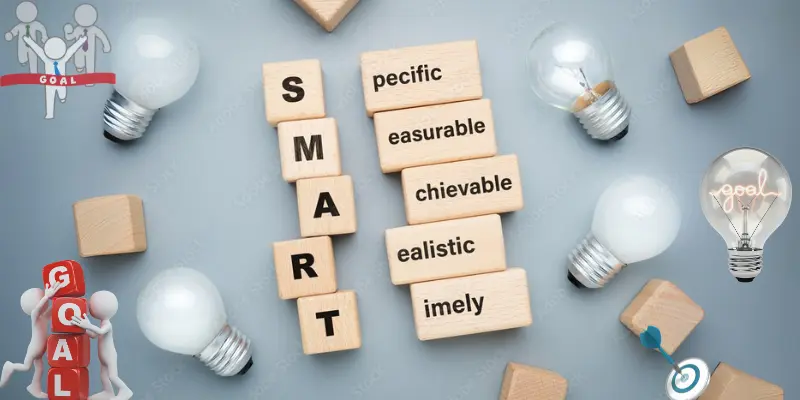How to Stay Focused on Long-Term Goals: Tips for Success
Published: 14 Jan 2026
Have you ever set a big goal but struggled to stay focused as time passed? Whether it’s advancing your career, improving your fitness, or achieving a personal milestone, how to stay focused on long-term goals can feel like an uphill battle. Life gets busy, distractions pop up, and motivation often fades when results take time.
But here’s the good news: staying focused on long-term goals is a skill you can learn, and it’s easier than you think. With simple, proven strategies like breaking your goals into small steps, building daily habits, and staying motivated, you can stay on track no matter how busy life gets.
Hi, I’m Tanveer. I’ve spent years helping people like you overcome the struggle of staying focused. In this article, I’ll share practical, actionable tips that have worked for beginners, students, and young professionals. By the end, you’ll have a clear roadmap to stay focused on your long-term goals, one step at a time.
Think of this as your guide to success. Ready to get started? Let’s dive in!
How to Stay Focused on Long-Term Goals: 8 Proven Steps
Staying focused on long-term goals doesn’t have to be overwhelming. You can turn your big dreams into achievable steps with the right strategies. Below, we’ll explore eight proven methods to help you stay on track, overcome distractions, and keep moving forward, no matter how busy life gets. Let’s get started!
1) Define Clear and Specific Goals
The first step in maintaining focus on your long-term goals is to define them clearly and precisely. Vague goals like get fit can feel overwhelming and hard to track. Instead, aim for specific and measurable goals, such as “run a 5K in 6 months.” This clarity gives you a roadmap to follow, making staying motivated and taking consistent action easier.
- Break your goals into measurable steps. For example, set weekly milestones to track your progress and build momentum.
- When I committed to “writing 500 words daily for 30 days,” it wasn’t just about improving skills; it became a journey of discipline and self-belief. Each small step built momentum, showing me how clarity in goals can turn dreams into reality.

2) Break Goals into Smaller Milestones
Long-term goals can feel overwhelming, but breaking them into smaller, manageable milestones makes them easier to achieve. Instead of focusing on a year-long goal, divide it into monthly or weekly tasks. This approach keeps you motivated and prevents you from feeling stuck.
- Why It Works: Smaller tasks are less intimidating and give you a sense of progress. Each milestone you achieve builds momentum and keeps you focused on the bigger picture.
- Set mini-goals and celebrate each one. For example, if you aim to save 10,000 in a year, aim to save 200 every week.
- When I aimed to read 50 books in a year, I broke it down to one book per week. Hitting that weekly target kept me motivated, and by the end of the year, I achieved my goal and built a lifelong reading habit
3) Create a Vision Board or Written Plan
Visualizing your goals is a powerful way to stay focused and motivated. Whether you create a vision board or write down a detailed plan, seeing your goals daily keeps you committed and motivated. Think of it as creating a mental blueprint for your success.
- Why It Works: Visualization helps you stay connected to your “why” and reminds you of what you’re working toward. It turns abstract dreams into tangible targets.
- Use tools like planners, journals, or digital apps (e.g., Trello, Notion) to track your progress and stay organized.
- When I created a vision board for my career goals, it became a daily reminder of where I wanted to be. Whenever I felt lost, I looked at it and re-energized to keep pushing forward.
4) Eliminate Distractions
Distractions are among the biggest obstacles to maintaining focus. They can derail your progress, whether it’s social media, procrastination, or a cluttered workspace. The key is to identify your distractions and create a focused environment.
- Why It Works: A distraction-free space helps you concentrate better and work more efficiently. It’s like clearing the weeds to let your goals grow.
- Set boundaries for distractions. For example, turn off notifications, use apps like Forest or Focus@Will, and create a dedicated workspace.
- Last month, I struggled to meet a deadline because my phone kept distracting me. I started turning it off for just 1 hour each day, and that small change helped me finish my work faster and with less stress. It reminded me of the power of protecting our focus, even in small ways.

5) Build Consistent Habits
Consistency is the secret to staying focused on your long-term goals. When you turn your efforts into daily habits, you rely less on motivation and more on discipline. Over time, these habits become second nature, making it easier to stay on track.
- Why It Works: Habits create a routine that reduces decision fatigue. You don’t have to think about what to do next; you just do it.
- Start with one small habit. For example, if your goal is to get fit, commit to a 10-minute workout every morning. Gradually increase the time as the habit sticks.
- A few months ago, I started waking up 30 minutes earlier to meditate and plan my day. At first, it was tough, but within weeks, it became a non-negotiable part of my routine. This small habit boosted my focus and gave me a sense of control and calm that carried through the rest of my day.
6) Track Your Progress Regularly
Tracking your progress is like having a GPS for your goals; it shows you where you are and how far you’ve come. Regularly reviewing your achievements keeps you motivated and helps you identify areas for improvement.
- Why It Works: Progress tracking gives you a sense of accomplishment and reminds you that you’re moving forward, even when the journey feels slow.
- Log your daily or weekly progress using tools like journals, habit trackers, or apps (e.g., Habitica, Strides). Celebrate small wins to stay motivated.
- When I started tracking my daily writing habits, I could see how consistent effort added up over time. Even when I felt stuck, looking back at my progress motivated me to keep going.
It does not matter how slowly you go as long as you do not stop.Confucius
7) Stay Flexible and Adapt
- Life doesn’t always go as planned, and that’s okay. Staying flexible helps you adjust your goals when things don’t work out. Instead of giving up, you can find new ways to keep moving forward.
- Revise your plan if something unexpected happens, like a delay or setback. Focus on smaller steps that keep you on track.
- I once planned a big career change but faced delays. Instead of quitting, I focused on smaller goals like learning new skills. This kept me moving forward and taught me the power of adaptability.

8) Surround Yourself with Support
- Staying focused on your goals is easier when you have the right people around you. Whether it’s friends, mentors, or an accountability partner, a strong support system keeps you motivated and on track.
- Join groups or communities that share similar goals and values. For example, if you’re learning a new skill, find an online group to share progress and get advice.
- When I felt stuck on a project, a friend introduced me to a small group of like-minded people. Their encouragement and accountability transformed my approach, reminding me that no goal is too big when you’re not alone in the journey.
Overcoming Challenges
Challenges are a natural part of any journey. Whether it’s setbacks, slow progress, or Burnout, how you handle these obstacles determines your success.
Here’s how to tackle common challenges and keep moving forward.
1. Dealing with Setbacks
- Setbacks are not failures; they’re opportunities to learn and grow. When things are unplanned, ask yourself: “What can I learn from this?” Every mistake teaches you something new and prepares you for the next step.
- If you face a setback, review your approach, identify what went wrong, and try again with a new strategy.
- Example: Don’t give up if you fail an exam or miss a workout. Analyze what went wrong, adjust your plan, and try again. Setbacks are stepping stones, not roadblocks.
The future depends on what you do today.Mahatma Gandhi
2. Staying Motivated During Slow Progress
- Progressing toward big goals often feels slow, but celebrating small wins motivates you. Every little victory reminds you that you’re moving forward.
- Reward yourself for milestones, no matter how small. For example, enjoy a favorite snack or take a relaxing break after completing a task.
- When I felt stuck on a project, I celebrated small wins, such as finishing a chapter or hitting a weekly target. These little rewards kept me motivated and focused.
Success is the sum of small efforts, repeated day in and day out. Robert Collier
3. Fighting Burnout
- Working toward long-term goals can be exhausting, but prioritizing self-care helps keep your energy and focus sharp. Think of your energy like a phone battery; it needs regular recharging.
- Take breaks, exercise regularly, and practice relaxation techniques such as deep breathing or meditation.
- When I felt overwhelmed, I started taking 10-minute walks during work hours. This small change helped me recharge and stay productive.
Conclusion
The road to achieving long-term goals isn’t always smooth, but the rewards of staying focused and committed are life-changing. When it comes to staying focused on long-term goals, breaking them down into smaller steps and celebrating small wins helps keep you motivated.
I recommend using a habit tracker or journal to stay accountable and track your progress.
Start today by writing down one goal and taking the first small step toward achieving it. Your dreams are within reach—go after them now!
| Did You Know |
|---|
|
FAQs
Here are answers to some common questions to help you stay focused on your long-term goals.
Staying motivated requires regular reminders of why your goal matters. To stay inspired, create a reward system for small milestones and track your progress. Surround yourself with supportive people who encourage your journey.
Missing a deadline doesn’t mean failure; it’s an opportunity to reassess and adjust. Revisit your plan, identify what slowed you down, and set a new, realistic timeline. Flexibility and persistence are key to long-term success.
Balancing goals starts with prioritizing what matters most each day. Use tools like to-do lists or time-blocking to organize your tasks effectively. Make progress on your goals in small, consistent steps without overwhelming yourself.
Review your goals on a weekly or monthly basis to monitor progress and stay on track. These check-ins help you celebrate wins and make necessary adjustments. Regular reviews keep you focused and motivated to move forward.
Break your goal into smaller, manageable milestones to make it less intimidating. Focus on one step at a time, rather than the entire journey. Remind yourself that progress, no matter how small, is still progress.
Identify your common distractions, like social media or procrastination, and take steps to minimize them. Set specific times for focused work and create a dedicated, distraction-free environment. Building consistent habits will help you stay on track.
You can use various tools, such as digital planners, goal-tracking apps, or even a simple journal. Choose what works best for you and fits your lifestyle. Visual aids, such as vision boards, can also help keep your goals fresh in your mind daily.

- Be Respectful
- Stay Relevant
- Stay Positive
- True Feedback
- Encourage Discussion
- Avoid Spamming
- No Fake News
- Don't Copy-Paste
- No Personal Attacks

- Be Respectful
- Stay Relevant
- Stay Positive
- True Feedback
- Encourage Discussion
- Avoid Spamming
- No Fake News
- Don't Copy-Paste
- No Personal Attacks






